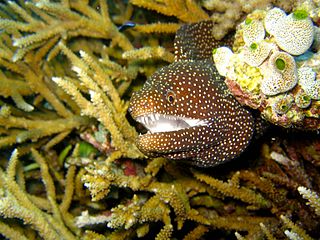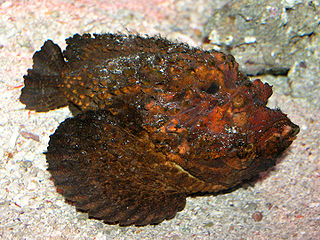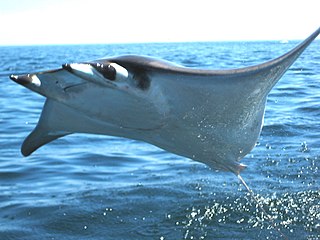
Cyprinidae is a family of freshwater fish commonly called the carp or minnow family, including the carps, the true minnows, and their relatives the barbs and barbels, among others. Cyprinidae is the largest and most diverse fish family, and the largest vertebrate animal family overall, with about 3,000 species; only 1,270 of these remain extant, divided into about 200 valid genera. Cyprinids range from about 12 mm in size to the 3 m (9.8 ft) giant barb. By genus and species count, the family makes up more than two-thirds of the ostariophysian order Cypriniformes. The family name is derived from the Greek word kyprînos.

A tuna is a saltwater fish that belongs to the tribe Thunnini, a subgrouping of the Scombridae (mackerel) family. The Thunnini comprise 15 species across five genera, the sizes of which vary greatly, ranging from the bullet tuna up to the Atlantic bluefin tuna, which averages 2 m (6.6 ft) and is believed to live up to 50 years.

Perch is a common name for freshwater fish from the genus Perca, which belongs to the family Percidae of the large order Perciformes. The name comes from Greek: πέρκη, romanized: perke, meaning the type species of this genus, the European perch.

Minnow is the common name for a number of species of small freshwater fish, belonging to several genera of the families Cyprinidae and Leuciscidae. They are also known in Ireland as pinkeens.
The eelpouts are the ray-finned fish family Zoarcidae. As the common name suggests, they are somewhat eel-like in appearance. All of the roughly 300 species are marine and mostly bottom-dwelling, some at great depths. Eelpouts are predominantly found in the Northern Hemisphere. The arctic, north pacific and north Atlantic oceans have the highest concentration of species, however species are found around the globe.

The electric rays are a group of rays, flattened cartilaginous fish with enlarged pectoral fins, composing the order Torpediniformes. They are known for being capable of producing an electric discharge, ranging from 8 to 220 volts, depending on species, used to stun prey and for defense. There are 69 species in four families.

Moray eels, or Muraenidae, are a family of eels whose members are found worldwide. There are approximately 200 species in 15 genera which are almost exclusively marine, but several species are regularly seen in brackish water, and a few are found in fresh water.

Monogeneans, members of the class Monogenea, are a group of ectoparasitic flatworms commonly found on the skin, gills, or fins of fish. They have a direct lifecycle and do not require an intermediate host. Adults are hermaphrodites, meaning they have both male and female reproductive structures.

Synanceiinae is a subfamily of venomous ray-finned fishes, waspfishes, which is classified as part of the family Scorpaenidae, the scorpionfishes and their relatives. These fishes are found in the Indo-Pacific oceans. They are primarily marine, though some species are known to live in fresh or brackish waters. The various species of this family are known informally as stonefish, stinger, stingfish and ghouls. Its species are known to have the most potent neurotoxins of all the fish venoms, secreted from glands at the base of their needle-like dorsal fin spines. The vernacular name, stonefish, for some of these fishes derives from their behaviour of camouflaging as rocks. The type species of the family is the estuarine stonefish.

Hexagrammidae, the greenlings, is a family of marine ray-finned fishes belonging to the suborder Cottoidei in the order Scorpaeniformes. These fishes are found in the North Pacific Ocean.

Mobula is a genus of rays in the family Mobulidae that is found worldwide in tropical and warm, temperate seas. Some authorities consider this to be a subfamily of the Myliobatidae. Their appearance is similar to that of manta rays, which are in the same family, and based on genetic and morphological evidence, the mantas belong in Mobula.

The Alert pigfish is a species of marine ray finned fish, a pigfish belonging to the family Congiopodidae. It is the only species in the monotypic genus Alertichthys. This species is endemic to the waters around New Zealand.

Stichaeidae, the pricklebacks or shannies, are a family of marine ray-finned fishes in the suborder Zoarcoidei of the order Scorpaeniformes. Most species are found in the North Pacific Ocean with a few in the North Atlantic Ocean.

The Alaska pollock or walleye pollock is a marine fish species of the cod genus Gadus and family Gadidae.

Lutjanidae, or snappers are a family of perciform fish, mainly marine, but with some members inhabiting estuaries, feeding in fresh water. The family includes about 113 species. Some are important food fish. One of the best known is the red snapper.

Tetraroginae is a subfamily of marine ray-finned fishes, commonly known as waspfishes or sailback scorpionfishes, belonging to the family Scorpaenidae, the scorpionfishes and their relatives. These fishes are native to the Indian Ocean and the West Pacific. As their name suggests, waspfishes are often venomous; having poison glands on their spines. They are bottom-dwelling fish, living at depths to 300 metres (980 ft). These creatures usually live in hiding places on the sea bottom.

Synanceia is a genus of ray-finned fish belonging to the subfamily Synanceiinae, the stonefish, which is classified within the family Scorpaenidae, the scorpionfish and relatives. Stonefish are the most venomous fish known; stings can be fatal to humans. They are found in the coastal regions of the Indo-Pacific and Caribbean.

The Catostomidae are the suckers of the order Cypriniformes, with about 78 species in this family of freshwater fishes. The Catostomidae are almost exclusively native to North America. The only exceptions are Catostomus catostomus, found in both North America and Russia, and Myxocyprinus asiaticus found only in China. In the Ozarks they are a common food fish and a festival is held each year to celebrate them. The bigmouth buffalo, Ictiobus cyprinellus, can reach an age up to 127 years, making it the oldest known freshwater teleost by more than 50 years.

Cichliformes is an order of fishes. Its members were previously classified under the order Perciformes, but now many authorities consider it to be an independent order within the subseries Ovalentaria.
Zaniolepis frenata, also known as the shortspine combfish, is a species of ray-finned fish belonging to the family Zaniolepididae.The species occurs in the eastern Pacific Ocean.

















